MENU
(Aug. 3, 2016 - by Harold Goerzen and Roger Reimer) It was a trip rife with challenges, but one that participants on a recent work team to Nepal said was well worth the effort and an eye-opener about how missions can take place in a country with few believers.
“We saw how Jesus is building His church in places where there was no church before,” said one of the volunteers from Bethel Church in Crown Point, Ind.
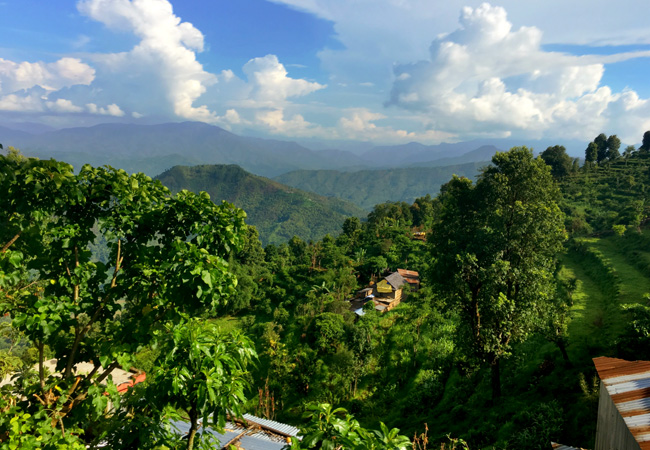 Another added, “Part of my heart will always remain with these people. What an amazing group of servants God has raised up there. May the Holy Spirit grow God’s church there in large numbers, and may they spread the gospel throughout the whole region.”
Another added, “Part of my heart will always remain with these people. What an amazing group of servants God has raised up there. May the Holy Spirit grow God’s church there in large numbers, and may they spread the gospel throughout the whole region.”
According to Joshua Project, Nepal is 82.5 percent Hindu, 11 percent Buddhist and 4 percent Muslim with just 0.9 percent of the population professing faith in Christ.
A nine-member team, led by Ty, Reach Beyond’s executive director of the Asia Pacific Region, visited the remote community of Harmi for a week in late June. Participants helped with rebuilding efforts more than a year after a pair of powerful earthquakes devastated the Himalayan nation in the spring of 2015.
The visitors completed their goals of demolishing the local partner’s quake-damaged radio station (established with Reach Beyond’s help in 2010) and completing the floor/foundation of the new building.
Coping with Quake’s Aftermath
The adobe-type construction used widely in Harmi—just 10 miles from the epicenter of the first quake—didn’t fare well in the disaster. However, only two people died in the community as people were either outside or able to escape before their homes and businesses collapsed.
“I would say over 90 percent of the buildings in Harmi were damaged,” observed IT specialist Ron With from Colorado Springs, Colo., one of five Reach Beyond staff members to visit Nepal along with the four travelers from the church in Indiana.
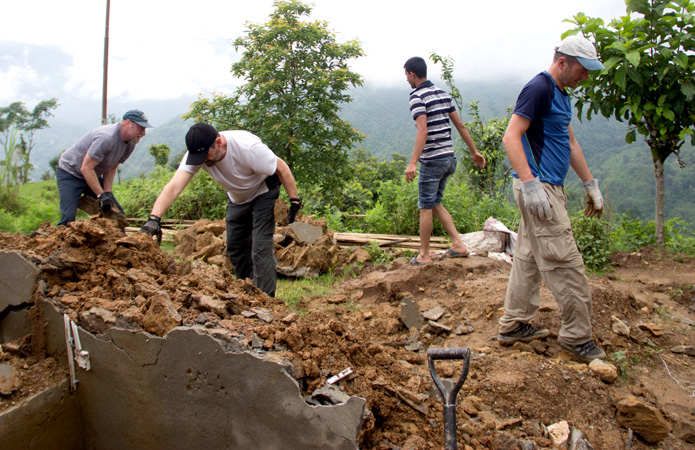 “Piles of rocks were everywhere with people living in temporary structures with tin roofs,” he noted. “The residents are working with the government to get funds and a community development housing plan.”
“Piles of rocks were everywhere with people living in temporary structures with tin roofs,” he noted. “The residents are working with the government to get funds and a community development housing plan.”
One structure unscathed by the temblor was the birthing center built with Reach Beyond’s help in 2013 when another group from Bethel Church joined with that project. Local workers are now expanding the facility, adding a medical clinic that will offer a variety of healthcare services.
Broadcasts, offering helpful information and gospel messages, continue from the local radio partner’s temporary studios, reaching an estimated 30,000 potential listeners. A visiting pastor recorded a number of programs for the station while the work team was in town.
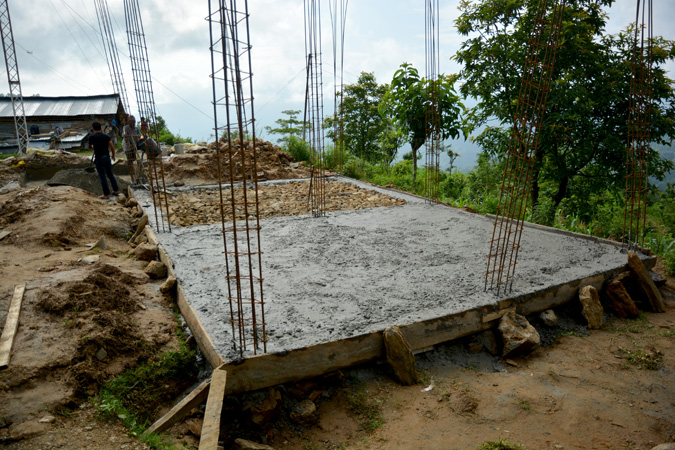 The team was also on hand when an excavator arrived to level the ground for a future church building that will double as a community center—a project local believers are doing on their own.
The team was also on hand when an excavator arrived to level the ground for a future church building that will double as a community center—a project local believers are doing on their own.
Overcoming Multiple Challenges
“Everything about this trip was hard,” admitted With. He pointed to monsoon rains, muddy roads, hot temperatures, grueling travel and difficult work and living conditions as just some of the challenges faced by the team.
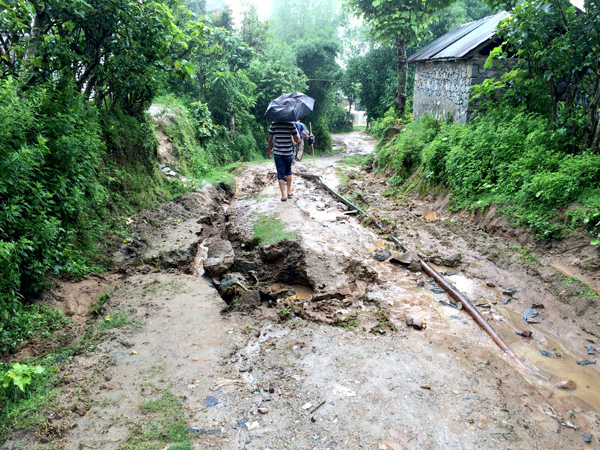 The outreach had been delayed from last November due to an economic blockade imposed by neighboring India, resulting in severe shortages of supplies ranging from gasoline to cement.
The outreach had been delayed from last November due to an economic blockade imposed by neighboring India, resulting in severe shortages of supplies ranging from gasoline to cement.
Reach Beyond engineer John Brewer said the team’s first challenge was making the seven-hour bus trip from Kathmandu to Harmi on a winding mountain road with many blind corners.
“Closer to the village we came to a mud road that was so rutted and slippery that our vehicle could go no further,” he explained. “A tractor with a big trailer came and carried our luggage/equipment and most of us the final stretch. A few of us decided to walk the remaining 40-plus minutes.”
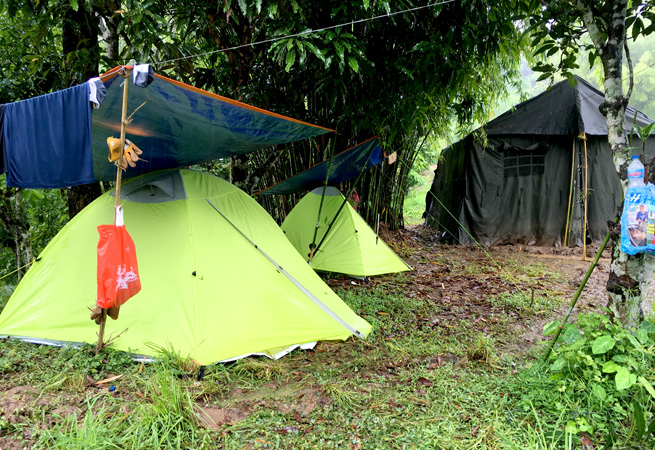 “We set up our tents (our home for a week) and slept until the wee hours when the rain came and flooded half of the tents,” Brewer related. “The second day we set up differently, digging trenches and putting tarps below and above the tents. After that we weathered the rain just fine. For those whose things were drenched, drying them was a big challenge since the weather was very humid. It rained often.”
“We set up our tents (our home for a week) and slept until the wee hours when the rain came and flooded half of the tents,” Brewer related. “The second day we set up differently, digging trenches and putting tarps below and above the tents. After that we weathered the rain just fine. For those whose things were drenched, drying them was a big challenge since the weather was very humid. It rained often.”
Water and electricity were available for only a “few hours each evening,” Brewer recounted. “We filled barrels with water to be used for washing and for flushing the toilet. We charged batteries when the power was on.”
In order to reach the worksite, team members had to negotiate a steep, muddy road down to Harmi, nestled in a valley, then cross the community and walk up a hill to the radio station. “It took 30 to 40 minutes if you were in good shape,” With commented. Community members used a tractor to deliver cement, sand and other materials to the construction site.
Helping with Reconstruction
The team worked alongside local laborers to tear down the 18-inch thick mud-and-stone walls of the old radio station, reclaiming the rocks to put in the base of the new building. The work was physically demanding—carrying rocks and sand bags, mixing cement and toting bricks.
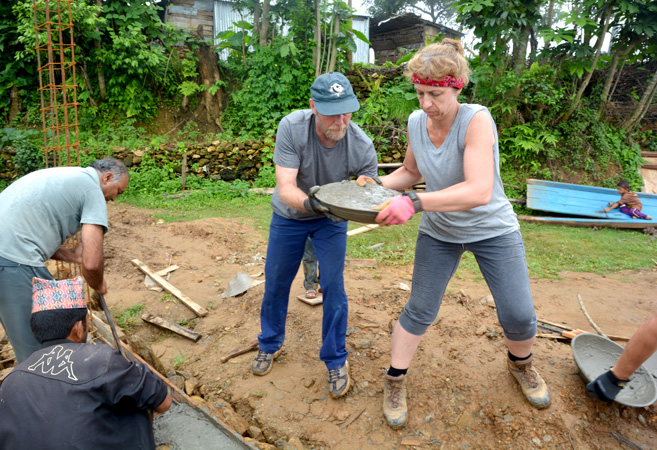 “Since we didn’t have any wheelbarrows, we moved materials by hand,” With noted. “We joined with the workers using 16-inch saucers to move some of the materials. Drinking water was carried up from the village. A man carried a bag full of liter-sized water bottles weighing a total of 80 pounds up the hill for us!”
“Since we didn’t have any wheelbarrows, we moved materials by hand,” With noted. “We joined with the workers using 16-inch saucers to move some of the materials. Drinking water was carried up from the village. A man carried a bag full of liter-sized water bottles weighing a total of 80 pounds up the hill for us!”
“We joined in starting a bucket brigade, moving concrete used in the base upon which the walls of the new station will be laid,” added Martin Harrison of Reach Beyond-UK. “It was incredibly hot and humid work under the monsoon sun. But the concrete floor, mixed and poured by hand, was completed—a good result for the team.”
While the team was glad to help with reconstruction, they agreed that meeting with about 25 believers at the local church (started within the last two years) highlighted the trip.
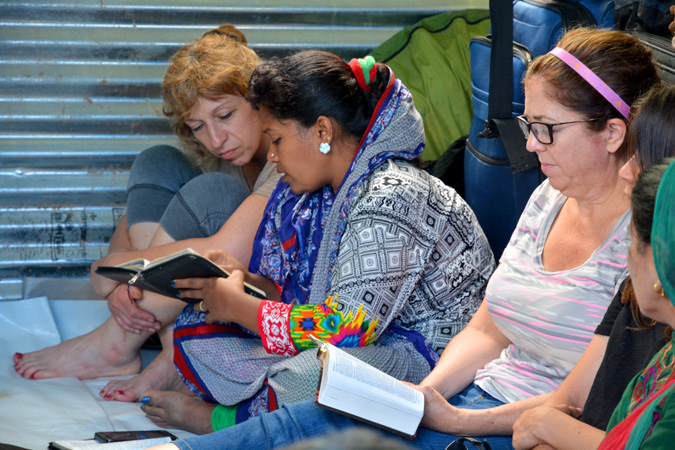 “The take-away for me was attending the mid-week church service,” With noted. “The people came out despite the rain so we could worship together. It was encouraging to see how many people in Harmi call themselves believers. Ten years ago there was only one Christian in Harmi. God is at work, changing hearts.”
“The take-away for me was attending the mid-week church service,” With noted. “The people came out despite the rain so we could worship together. It was encouraging to see how many people in Harmi call themselves believers. Ten years ago there was only one Christian in Harmi. God is at work, changing hearts.”
As one team member put it, “The worship times were a reminder of the privilege to worship with other believers. We take fellowship for granted, yet this young church thirsts for time with other believers.”
Another elaborated, “I was blown away observing the joy in the community. I didn’t expect that. They are very open and free in their worship—not self-conscious.”
Returning Home
Their work done, the visitors prepared for the long journey home. “The roads near Harmi had deteriorated even more while we were there, so we rode the tractor out to the point where our bus was able to get in,” Brewer related. This was followed by the hot, bumpy bus ride back to Kathmandu.
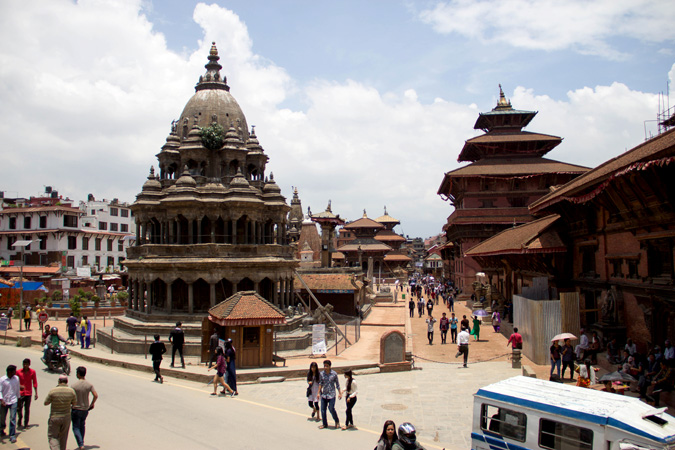 After spending a few days in the capital to do some sightseeing and learn more about the local partner’s ministry of rescuing thousands of Nepali women being trafficked across the border to India, the group faced one final challenge. Their connecting flight would go through the international airport in Istanbul, Turkey, where a terrorist bombing had taken place just hours earlier.
After spending a few days in the capital to do some sightseeing and learn more about the local partner’s ministry of rescuing thousands of Nepali women being trafficked across the border to India, the group faced one final challenge. Their connecting flight would go through the international airport in Istanbul, Turkey, where a terrorist bombing had taken place just hours earlier.
“It was unnerving taking off from the Kathmandu airport, knowing that the airport in Istanbul was not yet reopened and being told, ‘Hopefully it will be by the time you land,’” Harrison said.
Other than increased security, the attack didn’t cause any significant delays for the group, and they continued their trip back home—36 hours of nonstop travel for some.
Sources: Reach Beyond, Joshua Project
“We saw how Jesus is building His church in places where there was no church before,” said one of the volunteers from Bethel Church in Crown Point, Ind.
 Another added, “Part of my heart will always remain with these people. What an amazing group of servants God has raised up there. May the Holy Spirit grow God’s church there in large numbers, and may they spread the gospel throughout the whole region.”
Another added, “Part of my heart will always remain with these people. What an amazing group of servants God has raised up there. May the Holy Spirit grow God’s church there in large numbers, and may they spread the gospel throughout the whole region.”According to Joshua Project, Nepal is 82.5 percent Hindu, 11 percent Buddhist and 4 percent Muslim with just 0.9 percent of the population professing faith in Christ.
A nine-member team, led by Ty, Reach Beyond’s executive director of the Asia Pacific Region, visited the remote community of Harmi for a week in late June. Participants helped with rebuilding efforts more than a year after a pair of powerful earthquakes devastated the Himalayan nation in the spring of 2015.
The visitors completed their goals of demolishing the local partner’s quake-damaged radio station (established with Reach Beyond’s help in 2010) and completing the floor/foundation of the new building.
Coping with Quake’s Aftermath
The adobe-type construction used widely in Harmi—just 10 miles from the epicenter of the first quake—didn’t fare well in the disaster. However, only two people died in the community as people were either outside or able to escape before their homes and businesses collapsed.
“I would say over 90 percent of the buildings in Harmi were damaged,” observed IT specialist Ron With from Colorado Springs, Colo., one of five Reach Beyond staff members to visit Nepal along with the four travelers from the church in Indiana.
 “Piles of rocks were everywhere with people living in temporary structures with tin roofs,” he noted. “The residents are working with the government to get funds and a community development housing plan.”
“Piles of rocks were everywhere with people living in temporary structures with tin roofs,” he noted. “The residents are working with the government to get funds and a community development housing plan.”One structure unscathed by the temblor was the birthing center built with Reach Beyond’s help in 2013 when another group from Bethel Church joined with that project. Local workers are now expanding the facility, adding a medical clinic that will offer a variety of healthcare services.
Broadcasts, offering helpful information and gospel messages, continue from the local radio partner’s temporary studios, reaching an estimated 30,000 potential listeners. A visiting pastor recorded a number of programs for the station while the work team was in town.
 The team was also on hand when an excavator arrived to level the ground for a future church building that will double as a community center—a project local believers are doing on their own.
The team was also on hand when an excavator arrived to level the ground for a future church building that will double as a community center—a project local believers are doing on their own.Overcoming Multiple Challenges
“Everything about this trip was hard,” admitted With. He pointed to monsoon rains, muddy roads, hot temperatures, grueling travel and difficult work and living conditions as just some of the challenges faced by the team.
 The outreach had been delayed from last November due to an economic blockade imposed by neighboring India, resulting in severe shortages of supplies ranging from gasoline to cement.
The outreach had been delayed from last November due to an economic blockade imposed by neighboring India, resulting in severe shortages of supplies ranging from gasoline to cement.Reach Beyond engineer John Brewer said the team’s first challenge was making the seven-hour bus trip from Kathmandu to Harmi on a winding mountain road with many blind corners.
“Closer to the village we came to a mud road that was so rutted and slippery that our vehicle could go no further,” he explained. “A tractor with a big trailer came and carried our luggage/equipment and most of us the final stretch. A few of us decided to walk the remaining 40-plus minutes.”
 “We set up our tents (our home for a week) and slept until the wee hours when the rain came and flooded half of the tents,” Brewer related. “The second day we set up differently, digging trenches and putting tarps below and above the tents. After that we weathered the rain just fine. For those whose things were drenched, drying them was a big challenge since the weather was very humid. It rained often.”
“We set up our tents (our home for a week) and slept until the wee hours when the rain came and flooded half of the tents,” Brewer related. “The second day we set up differently, digging trenches and putting tarps below and above the tents. After that we weathered the rain just fine. For those whose things were drenched, drying them was a big challenge since the weather was very humid. It rained often.”Water and electricity were available for only a “few hours each evening,” Brewer recounted. “We filled barrels with water to be used for washing and for flushing the toilet. We charged batteries when the power was on.”
In order to reach the worksite, team members had to negotiate a steep, muddy road down to Harmi, nestled in a valley, then cross the community and walk up a hill to the radio station. “It took 30 to 40 minutes if you were in good shape,” With commented. Community members used a tractor to deliver cement, sand and other materials to the construction site.
Helping with Reconstruction
The team worked alongside local laborers to tear down the 18-inch thick mud-and-stone walls of the old radio station, reclaiming the rocks to put in the base of the new building. The work was physically demanding—carrying rocks and sand bags, mixing cement and toting bricks.
 “Since we didn’t have any wheelbarrows, we moved materials by hand,” With noted. “We joined with the workers using 16-inch saucers to move some of the materials. Drinking water was carried up from the village. A man carried a bag full of liter-sized water bottles weighing a total of 80 pounds up the hill for us!”
“Since we didn’t have any wheelbarrows, we moved materials by hand,” With noted. “We joined with the workers using 16-inch saucers to move some of the materials. Drinking water was carried up from the village. A man carried a bag full of liter-sized water bottles weighing a total of 80 pounds up the hill for us!”“We joined in starting a bucket brigade, moving concrete used in the base upon which the walls of the new station will be laid,” added Martin Harrison of Reach Beyond-UK. “It was incredibly hot and humid work under the monsoon sun. But the concrete floor, mixed and poured by hand, was completed—a good result for the team.”
While the team was glad to help with reconstruction, they agreed that meeting with about 25 believers at the local church (started within the last two years) highlighted the trip.
 “The take-away for me was attending the mid-week church service,” With noted. “The people came out despite the rain so we could worship together. It was encouraging to see how many people in Harmi call themselves believers. Ten years ago there was only one Christian in Harmi. God is at work, changing hearts.”
“The take-away for me was attending the mid-week church service,” With noted. “The people came out despite the rain so we could worship together. It was encouraging to see how many people in Harmi call themselves believers. Ten years ago there was only one Christian in Harmi. God is at work, changing hearts.”As one team member put it, “The worship times were a reminder of the privilege to worship with other believers. We take fellowship for granted, yet this young church thirsts for time with other believers.”
Another elaborated, “I was blown away observing the joy in the community. I didn’t expect that. They are very open and free in their worship—not self-conscious.”
Returning Home
Their work done, the visitors prepared for the long journey home. “The roads near Harmi had deteriorated even more while we were there, so we rode the tractor out to the point where our bus was able to get in,” Brewer related. This was followed by the hot, bumpy bus ride back to Kathmandu.
 After spending a few days in the capital to do some sightseeing and learn more about the local partner’s ministry of rescuing thousands of Nepali women being trafficked across the border to India, the group faced one final challenge. Their connecting flight would go through the international airport in Istanbul, Turkey, where a terrorist bombing had taken place just hours earlier.
After spending a few days in the capital to do some sightseeing and learn more about the local partner’s ministry of rescuing thousands of Nepali women being trafficked across the border to India, the group faced one final challenge. Their connecting flight would go through the international airport in Istanbul, Turkey, where a terrorist bombing had taken place just hours earlier.“It was unnerving taking off from the Kathmandu airport, knowing that the airport in Istanbul was not yet reopened and being told, ‘Hopefully it will be by the time you land,’” Harrison said.
Other than increased security, the attack didn’t cause any significant delays for the group, and they continued their trip back home—36 hours of nonstop travel for some.
Sources: Reach Beyond, Joshua Project
